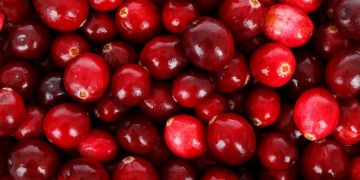Historical use
Cranberry's medicinal properties have been recognised for centuries. Native Americans used raw cranberries as a wound dressing. Early settlers from England learned to use the berry both raw and cooked for a number of ailments including appetite loss, digestive problems, blood disorders, and scurvy (vitamin C deficiency that causes weakness, gum disease, and spontaneous bleeding in the skin).
Medicinal properties
The cranberry fruit is high in antioxidants, partly from substances called proanthocyanidins. Antioxidants scavenge damaging particles in the body known as free radicals. Environmental toxins (including ultraviolet light, radiation, cigarette smoking, and air pollution) can increase the number of free radicals in the body, which are believed to contribute to the ageing process as well as the development of a number of health problems such as heart disease, cancer, and infections. Antioxidants can neutralise free radicals and may reduce or even help prevent some of the damage they cause. Cranberries are an excellent source of vitamin C as well, another important antioxidant. The juice is excellent against scurvy and to allay fevers. Cranberries also contain a potent vasodilator and have been used for breathing problems.
Several studies have measured high levels of antioxidants in people after drinking cranberry juice. Research is underway to determine if the antioxidant ability of cranberries will translate into protection from heart disease. Adding to cranberry's potential health benefits, a recent study found that an extract of cranberry inhibited an enzyme, and this has been associated with a reduction in cancer risk.
Combatting UTIs
In the early 1920s, American scientists discovered that people who eat large amounts of cranberries have more acid in their urine than those who do not eat high amounts of the berry. Because bacteria cannot survive in an acidic environment, the researchers speculated that a diet rich in cranberries may help prevent and treat urinary tract infections (UTIs). In time, the popularity of cranberry for UTIs soared and many women reported satisfactory results from drinking cranberry juice.
UTIs are a serious health problem affecting millions of people each year. Cranberry appears to be more effective than certain probiotics in preventing recurrent UTIs and are often used as a supplement to try to prevent or fight them. Infections of the urinary tract are common; only respiratory infections occur more often. Each year, UTIs account for about 9.6 million doctor visits. One woman in five develops a UTI during her lifetime; UTIs in men are not so common. Nearly 20% of women who have a UTI will have more than one and 30% of those will have more than two. Most infections arise from one type of bacteria, Escherichia coli, which normally live in the colon. Usually, the latest infection stems from a strain or type of bacteria that is different from the infection before it, indicating a separate infection.
Preventing UTIs
NIH-funded research suggests that one factor behind recurrent UTIs may be the ability of bacteria to attach to cells lining the urinary tract. Current belief is that the prevention of UTI is achieved by inhibiting the infecting bacteria, E. coli, from adhering to uroepithelial cells (Sobota 1984; Schmidt and Sobota 1988; Zafriri 1989; Ofek 1991; Howell 1998). Bacterial adherence to these cells is a critical step in the development of infection, without which the causative bacteria are flushed, preventing their colonisation of the urinary tract.
An Israeli research group looked at chemical fractions of a number of fruit juices. They found that fructose, a common sugar in many fruit juices, had some anti-adherence effect on the bacterium. They also found that a nondialyzable polymeric compound isolated from cranberry juice (and blueberry juice) had the most potent effect. In 1991 Israeli researchers, publishing in The New England Journal of Medicine, duplicated the previous studies and confirmed the results.
Other medicinal uses
Further laboratory studies indicated that cranberries also prevent another microorganism known as Helicobacter pylori from adhering to cell walls. H. plyori is a bacteria that can cause stomach ulcers, so it is possible that cranberries may eventually prove to play a role in the prevention of this condition. Studies also suggest that cranberries may help prevent bacteria from adhering to gums and around the teeth.





